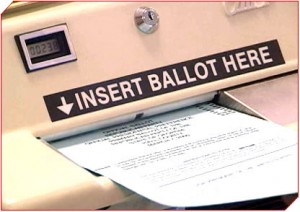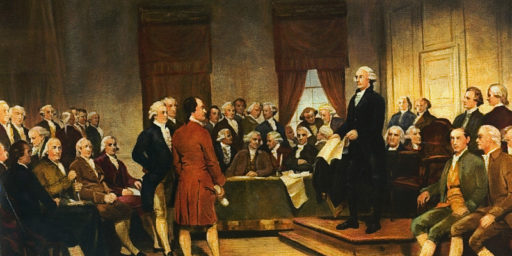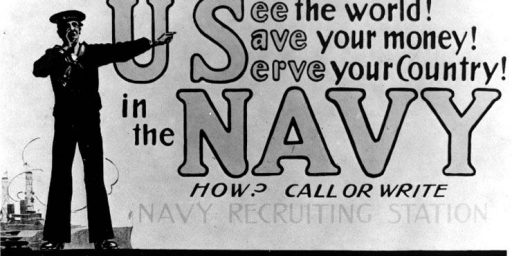Election Day Mess
 We could well be in for our third controversial presidential election in a row, Mary Pat Flaherty reports in a front page story in today’s WaPo.
We could well be in for our third controversial presidential election in a row, Mary Pat Flaherty reports in a front page story in today’s WaPo.
Faced with a surge in voter registrations leading up to Nov. 4, election officials across the country are bracing for long lines, equipment failures and confusion over polling procedures that could cost thousands the chance to cast a ballot.
The crush of voters will strain a system already in the midst of transformation, with jurisdictions introducing new machines and rules to avoid the catastrophe of the deadlocked 2000 election and the lingering controversy over the 2004 outcome. Even within the past few months, cities and counties have revamped their processes: Nine million voters, including many in the battleground states of Ohio, Florida and Colorado, will use equipment that has changed since March.
[…]
Since Congress passed the Help America Vote Act six years ago, $3 billion in federal funds has been spent to overhaul voting operations, much of it for new equipment. With touchscreen machines falling out of favor, an increasing number of the nation’s voters — just over half — will use paper ballots, which will be read by optical scanners. That will produce a paper trail that can serve as a backup if questions arise over tallies.
For more than half of the states, this will be the first presidential election using statewide databases required by the 2002 law to improve the accuracy of voter rolls. When voters arrive at the polls, their information must match the list in order for them to receive a regular ballot. That could trigger contentious questions in places with particularly rigid rules on what constitutes a match.
Both campaigns have lined up teams of lawyers to challenge any irregularities, from registrations to polling place problems to vote counts.
Just what we need.
This just shouldn’t be that hard. No system is going to be perfect given the combination of very large turnout and close results. At the very least, though we should be able to eliminate people leaving the polling place unsure of who they voted for or total reliance on machines.
Hand-marked, machine readable paper ballots have been around for decades, are easily understandable, and provide a backup plan in case there’s a problem with the machines. The worst possible system is one that’s constantly changing, so that neither the voters nor poll workers are familiar with the process.






Not only that but study after study has shown mark sense to be every bit as reliable as completely manual ballots and more reliable than the voting machines that dominated years ago (and in some places are still in use, I believe).
The rush to fully electronic voting was done in a panic after the Florida debacle in 2000. My own belief is that the problem then was Florida, not the machines.
The move to electronic voting, like other things done in haste, will be repented at leisure.
There is one genuinely good argument for the fully electronic voting machines: accessibility. For that reason I think that they should be available but I don’t think they should be mandatory for all voting.
Totally! This is why I’ve been arguing for years that we need to simply do away with elections. I am hoping that Bush will do the right thing and dissolve Congress sometime in late October and remain in office so we won’t have to deal with this crap and so Bush can finish the mission.
I normally avoid the tinfoil crowd, but JJ’s and Dave Schuler’s perfectly valid points illustrate what bothers me about this issue:
(1) Perfectly easy steps, like paper receipt backups, are not being taken to allow cross-checking of the electronic totals.
(2) Electronic machines are eminently hackable.
Given that we know (1) and (2), it’s understandable how someone could think that the hackability of the machines is a feature, not a bug.
Right on, Anderson. I’ve been an election judge for 25 years and it’s possible I’m the only regular commenter at OTB who’s ever been on the design team for a voting machine. Our design used proven technologies and provided paper backups in addition to being thoroughly auditable.
The systems I’ve seen have a form of paper receipt but they’re not really adequate since they can’t be used to reproduce the results of the election.
I’m sorry, what controversy?
Why is this myth still being promulgated by the so-called main-stream media?